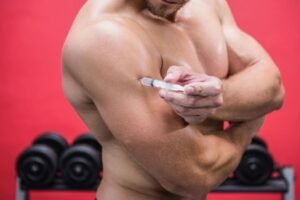Pushing Your Limits & Still Having Questions Why Am I Not Sweating When I Workout?
After completing a grueling workout session, people normally get drenched in sweat. In fact, sweating is the number one signal that you’ve done your workout with dedication. It’s even easier to think that if you didn’t sweat, you didn’t even try. Many even take pride in sweating heavily while working out.

However, sometimes there’s a possibility that no matter how hard a person goes with their workout, they don’t sweat like others. You may be one of those who may be questioning why am I not sweating when I workout and some sweat like Niagara Falls in my gym.
No doubt, when you do any physical activity like strength training, it’s natural that your body temperature will rise, and you will begin to sweat. Sweating is one of the natural processes that help regulate body temperature and prevent overheating. However, if you aren’t sweating, it doesn’t necessarily mean you aren’t working out effectively, and other reasons could also exist.
Let’s find out why you aren’t sweating and what you can do to resolve that issue.
7 Reasons for Your Question – Why Am I Not Sweating When I Workout
There could be many reasons why you’re not sweating during a workout, and some of them that you shouldn’t ignore is:
1. Your Body Is Dehydrated
Dehydration is very common, and most of the time, it’s the reason you don’t sweat much. Put simply, you aren’t drinking enough water, and your body is dehydrated. Once your body starts dehydrating, it’ll lack fluids that produce sweat. Hence, if you don’t drink enough water before, during, or after the workout, your body won’t sweat. Similarly, it’s recommended to drink plenty of water to rehydrate yourself. Therefore, it’s essential that you drink at least eight glasses of water per day to stay hydrated.
2. You’re on Medication
Another reason for your question about why don’t I sweat when I workout is possible that you might be on certain medication. Yes, some medicines can affect your body’s ability to sweat—for example, blood pressure, antipsychotics, or antihistamines medicines. If you’re taking any of these medicines, you must consult your doctor to determine if that affects your body’s sweating ability.
3. Medical Condition
Some medical conditions, such as diabetes, autonomic neuropathy, and hypothyroidism, can interfere with the nerves that control your sweat glands, which can result in reduced sweating or not sweating at all during the workout. Hence, if you suspect you have such a medical condition, then it’s essential you consult your doctor and get a proper diagnosis or treatment.
4. Genetics
Genetics plays one of a vital role in how much you sweat. Some people can naturally sweat more compared to others because of their genes. Hence, if you cannot sweat during your workout, it could be because of your genetics. Similarly, if you do not see any symptoms like dizziness or nausea, then it’s nothing to worry about either.
5. Your Age
As you start aging, your body’s ability to sweat also decreases. It’s because your sweat glands get less active, and your skin starts thinning. Hence, if you’re an older person concerned about how to sweat more during a workout, don’t worry. Again, it’s because of your age. First, ensure you’re keeping your body hydrated by drinking adequate water and prevent yourself from overheating by taking needed breaks.
6. Your Fitness Level
If you’re a rookie and have started working out or haven’t been working out regularly, you may not sweat like others who are physically fit and work out regularly. It’s because your body is not used to with the increased physical activity, nor your sweat glands are active enough. And, once you get more physically fit and your body adapts to it, you will see your body sweating more during workouts.
7. Environmental Factors
The environment you’re surrounded with also plays a big role in how much you’ll sweat during your workout. For example, if you’re working out in a gym that has air conditioning, then it’s obvious you won’t sweat like anyone who works in a gym that doesn’t have air conditioning. Similarly, if you work out in a humid environment like outdoors on a hot & humid day, then it’s evident that you’ll sweat more. Hence, it becomes important that you adjust yourself and your workout that fits your environment, which will help in preventing from overheating.
Here’s How to Sweat More During Workout – 6 Easy Tips to Follow
Are you among those who, most of the time, keep questioning, why don’t you sweat when I workout? If yes, then don’t worry. Here we’ve six easy steps to help you address this issue of not sweating even when you do some good workouts that should make you sweat heavily.
- Ensure you drink enough water before, during, and even after your workout, and keep your body well hydrated.
- Those who workout in a cool environment should consider increasing their workout intensity or consider to workout in a warmer environment. Similarly, if you’re working out in a humid environment, you should reduce your workout intensity or take breaks to prevent overheating your body.
- People on medications should consult their doctor and ensure that the medicine is not affecting their ability to sweat. If so, the doctor may prescribe you alternate medicine that doesn’t affect your sweat glands.
- Are you among those who don’t workout regularly? If you answer yes, consider exercising regularly, as your body will gradually adapt to the workout, and you’ll begin sweating.
- Those who have any medical condition like diabetes or any other disease then should consult their doctor and find out whether it’s affecting their sweating ability.
- Lastly, those believes have genetics that may be causing you not to sweat even during or after the workout, and if you don’t find yourself dizzy or nauseous, then relax. There’s nothing to worry about. And ensure you’re keeping yourself hydrated by drinking enough water.
Closing Thoughts
Sweating is one of the natural processes that your body uses to regulate the body’s temperature during physical activity. Therefore, if you aren’t sweating during a workout, it can be a cause of concern. However, there are several reasons due to which one doesn’t sweat, and it could be due to dehydration, medical condition, fitness level, age, or any other factor.
Nonetheless, if you end up questioning why don’t I sweat when I workout or how to sweat more during workouts, then here we’ve covered some of the common factors that could be a reason. We hope you find this article helpful. Good luck!







